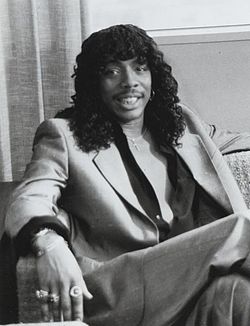Rick James Quotes
About Author
James Ambrose Johnson Jr. (February 1, 1948 – August 6, 2004), better known by his stage name Rick James, was an American singer, songwriter, and record producer. Born and raised in Buffalo, New York, James began his musical career in his teenage years. He was in various bands before entering the U.S. Naval Reserve to avoid being drafted into the Army. In 1964, James moved to Toronto, Canada, where he formed the rock band The Mynah Birds, who eventually signed a recording deal with Motown Records in 1966. James's career with the group halted after military authorities discovered his whereabouts and eventually convicted him of desertion related charges. He served several months in jail. After being released, James moved to California, where he started a variety of rock and funk groups in the late 1960s and early 1970s.
After forming the locally popular Stone City Band in his hometown of Buffalo in 1977, James finally found success as a recording artist after signing with Motown's Gordy Records, releasing the album Come Get It! in 1978 which produced the hits "You & I" and "Mary Jane". In 1981, James released his most successful album, Street Songs, which included career-defining hits such as "Give It to Me Baby" and "Super Freak", the latter song becoming his biggest crossover single, mixing elements of funk, disco, rock, and new wave. James was also known for his soulful ballads such as "Fire & Desire" and "Ebony Eyes". He also had a successful career as a songwriter and producer for other artists, including Teena Marie, the Mary Jane Girls, The Temptations, Eddie Murphy, and Smokey Robinson.
James's mainstream success peaked by the release of his album Glow in 1985 and his appearance on the popular TV show, The A-Team. His subsequent album releases failed to sell as well as their predecessors. Rapper MC Hammer sampled James's "Super Freak" for his breakout 1990 hit, "U Can't Touch This", which won Best R&B Song at the 1991 Grammy Awards. James received his only Grammy for composing the song. By the early 1990s, James's career was hampered by his drug addiction, and he was embroiled in legal issues. In 1993, he was convicted of two separate instances of kidnapping and assaulting two different women while under the influence of crack cocaine, resulting in a three-year sentence at Folsom State Prison. He was released on parole in 1996. His health problems halted his career again after he had a mild stroke during a concert in 1998, and he announced a semi-retirement.
In 2004, James's career returned to mainstream pop culture after he appeared in an episode of Chappelle's Show. The segment involved a Charlie Murphy True Hollywood Stories-style sketch that satirized James's wild lifestyle in the 1980s. This resulted in renewed interest in his music, and that year he returned to perform on the road. He died later that year from heart failure at age 56.
After forming the locally popular Stone City Band in his hometown of Buffalo in 1977, James finally found success as a recording artist after signing with Motown's Gordy Records, releasing the album Come Get It! in 1978 which produced the hits "You & I" and "Mary Jane". In 1981, James released his most successful album, Street Songs, which included career-defining hits such as "Give It to Me Baby" and "Super Freak", the latter song becoming his biggest crossover single, mixing elements of funk, disco, rock, and new wave. James was also known for his soulful ballads such as "Fire & Desire" and "Ebony Eyes". He also had a successful career as a songwriter and producer for other artists, including Teena Marie, the Mary Jane Girls, The Temptations, Eddie Murphy, and Smokey Robinson.
James's mainstream success peaked by the release of his album Glow in 1985 and his appearance on the popular TV show, The A-Team. His subsequent album releases failed to sell as well as their predecessors. Rapper MC Hammer sampled James's "Super Freak" for his breakout 1990 hit, "U Can't Touch This", which won Best R&B Song at the 1991 Grammy Awards. James received his only Grammy for composing the song. By the early 1990s, James's career was hampered by his drug addiction, and he was embroiled in legal issues. In 1993, he was convicted of two separate instances of kidnapping and assaulting two different women while under the influence of crack cocaine, resulting in a three-year sentence at Folsom State Prison. He was released on parole in 1996. His health problems halted his career again after he had a mild stroke during a concert in 1998, and he announced a semi-retirement.
In 2004, James's career returned to mainstream pop culture after he appeared in an episode of Chappelle's Show. The segment involved a Charlie Murphy True Hollywood Stories-style sketch that satirized James's wild lifestyle in the 1980s. This resulted in renewed interest in his music, and that year he returned to perform on the road. He died later that year from heart failure at age 56.
